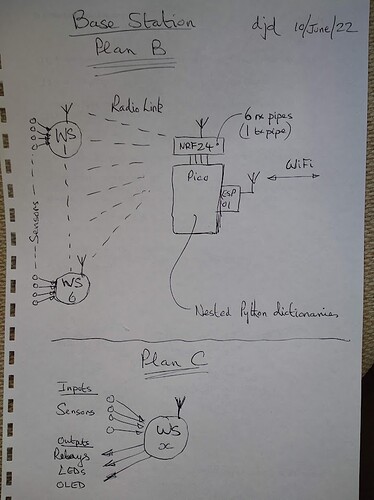Thanks - I'll follow up those suggestions.
Just a thought but you don't need to use LoRaWAN, but you could have your own point to point or mesh network with LoRa, that way you are not reliant upon a LoRaWAN gateway and you won't be restricted in the amount of daily data either.
I already use a couple of LoRa 'radio's' to exchange data, no internet required.
Here's a quick update on the current state of my NRF24 project.
I've got two of my old WS working and sending readings to the Pico-based base-station.
So Plan-B is now working.
Last night when I was resting in bed before going to sleep I was writing some Python code in my head.
Yes, I know it sounds weird but my brain seems quite productive when I'm about to go to sleep.
My idea was to use nested dictionaries as a mini database and a table lookup on the wsID (100 or 101).
Then use the ID to determine which part of the dB to write the incoming radio data.
I'm also using 'lookup' when a command is sent from Node-RED asking for a 'report'.
At the moment the base-station just stores the information and sends a message saying...
message: "Base-station just got data from remote 101"
Just as a test in Node-RED I use a 'switch' node to check for '100' or '101' and then send a command via MQTT to the base-station asking for a report, like this...
msg.payload = {nodeID: "pico01", cmd: "report", "wsID": 100};

Sure!?? I though you still have to restrict the time on air but I might be wrong. I have two of these devices in a LoRa configuration, works fine
As long as you don't start talking Python to you wife ![]()


